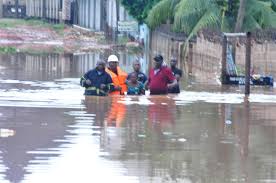ONE of the perennial challenges facing many parts of Nigeria is the problem of flood ravaging many states and precipitating socio -economic pains on the citizens.
With the increasing rainfall now here with us and considering the predicted impending disaster therefrom, it is only imperative that urgent steps ought to be taken prior to the onset of the rainy season as precautionary measure.
Unfortunately, and more often than not, proactive measures are hardly resorted to and this has sadly led to avoidable challenges escalating to endemic level before receiving attention.
For the avoidance of doubt, the Federal government recently raised the red flag that in April, May and June period, 25 states and 72 local government areas (LGAs) in the country are in flood high-risk areas and will be exposed to heightened vulnerability to flooding from the months of July to September and will subsequently spread to 33 states and 135 LGAs high-risk areas.
Some of the high risk states according to the Minister of Water Resources, Professor Joseph Terlumum are Akwa-Ibom, Anambra, Adamawa, Benue, Bayelsa, Cross River, Delta, Edo, Jigawa, Kogi, Kebbi, Kaduna, Niger, Nassarawa, Ogun Ondo, Rivers, Taraba and Federal Capital Territory (FCT) Abuja.
We cannot but be deeply concerned about this hint of impending flooding as the seasonal disasters always come with tremendous burden and pains on citizens and government of the vulnerable areas.
For instance, government spends huge sums of income for the construction of Internally Displaced Persons (IDPs) camps in addition to taking care of feeding, medical and general wellbeing of the flood victims, while the challenge lasts.
Many victims sometimes have their farm lands, houses, shops and other life-time property lost to the ravaging flood which in some cases may even claim lives.
This is worrisome and deserves prompt and multi-sectoral approach to at least mitigate the pains and losses associated with the perennial flood disaster.
It is against this backdrop that we advocate for urgent and concrete steps to be promptly taken to ameliorate the devastating impact of flood, especially among the riverine areas and other parts of the state vulnerable to the impending attack of flood.
While we commend the state government for already working hard to tackle the menace, it is our firm view that there must be a clear demonstration of patriotic zeal, commitment, sincerity of purpose and strength of character by persons or agencies directly charged with giving eloquent expression to governments good intentions of extending help to citizens in the very crucial times of need.
For instance, food aids, medical facilities including drugs and other needs of the various camps should be made available to the beneficiaries without discrimination or diversion.
The quality and standards of such emergency services should also not be compromised for any reason..
This can be accomplished by the state government setting up a reliable team driven by patriotic zeal to monitor the effective distribution of services to the camps.
Prompt desilting of drains, discouraging blockade of natural waterways by indiscriminate dumping of refuse and building structures on same should be vigorously pursued by the relevant government agency.
Residents of high risk areas such as the riverine areas should also imbibe the culture of seasonal prompt relocation or migration to safer terrains before flood devastation sets in.
This will not only reduce the impact of economic loss but go a long way in preventing human casualties sometimes associated with flood disaster.
Minimising the effect of this year’s flood ravages will definitely go a long way in checking the spread of cholera now endemic in parts of the country. All hands should, therefore, be on deck to reduce the impact of the flood to the barest minimum.


